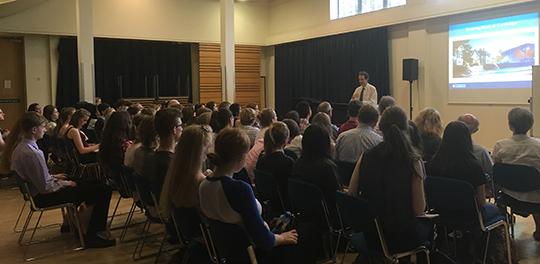
What makes the Cambridge system so special is the complementary relationship between Faculty and College teaching. Faculty teaching primarily takes the form of lectures and seminars.
Lectures are more formal classes given by Faculty staff, which provide you with a framework upon which you can build your own self-directed study. Seminars consist of slightly smaller groups of between 10 and 20 students, and are more interactive than lectures, involving student participation through presentations and discussion.
In addition to the Faculty lectures and seminars, Colleges arrange small-group supervisions with a team of specialist supervisors to complement the Faculty teaching for every course studied. Supervisions are taught individually for harmony and counterpoint, practical musicianship, and independent projects (dissertation, composition, etc.), and in groups of between two and four students for other courses. Supervisions represent the core of the work done during the term: you will normally be asked to prepare an essay, presentation, harmony and counterpoint exercise, or other piece of work for each supervision; you then receive feedback on this work from your supervisor, but you are not formally assessed on it: this means that you can try things out, take risks, explore new approaches and clarify aspects of the topic about which you are unsure. A more detailed explanation of the supervision system can be found on the University website.
Some subjects, such as Composition and Performance, are best studied in the form of workshops or masterclasses alongside individual tuition. For composers, we run weekly workshops with invited guests that bring student composers at all levels together. For Performance, our regular Practising Performance series includes masterclasses for conductors, solo and chamber performers, topic-based workshops (e.g. on recitative-singing, or good practice techniques), and sessions on musicians’ health and wellbeing.



